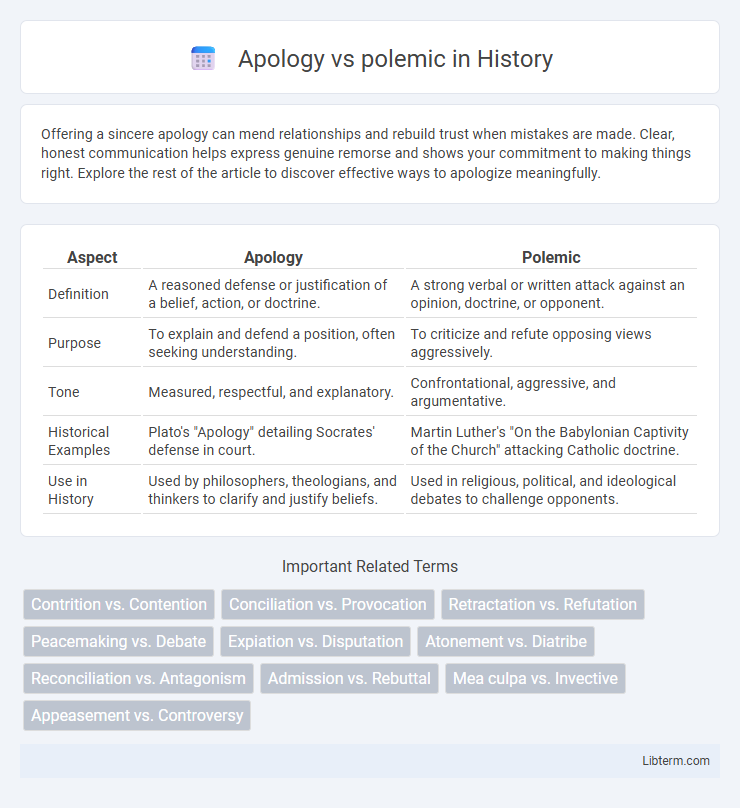Offering a sincere apology can mend relationships and rebuild trust when mistakes are made. Clear, honest communication helps express genuine remorse and shows your commitment to making things right. Explore the rest of the article to discover effective ways to apologize meaningfully.
Table of Comparison
| Aspect | Apology | Polemic |
|---|---|---|
| Definition | A reasoned defense or justification of a belief, action, or doctrine. | A strong verbal or written attack against an opinion, doctrine, or opponent. |
| Purpose | To explain and defend a position, often seeking understanding. | To criticize and refute opposing views aggressively. |
| Tone | Measured, respectful, and explanatory. | Confrontational, aggressive, and argumentative. |
| Historical Examples | Plato's "Apology" detailing Socrates' defense in court. | Martin Luther's "On the Babylonian Captivity of the Church" attacking Catholic doctrine. |
| Use in History | Used by philosophers, theologians, and thinkers to clarify and justify beliefs. | Used in religious, political, and ideological debates to challenge opponents. |
Understanding Apology and Polemic: Key Definitions
Apology is a reasoned defense of a belief or action, aiming to clarify and justify rather than concede fault, often used in philosophical and theological contexts to present arguments respectfully. Polemic, by contrast, is a strong verbal or written attack on a particular opinion or doctrine, designed to refute or criticize aggressively. Understanding these definitions highlights how apologies seek constructive dialogue, while polemics often intensify debate through confrontational rhetoric.
Historical Origins of Apology and Polemic
The historical origins of apology trace back to ancient Greece, where Aristotle defined it as a reasoned defense against accusations, exemplified by Plato's "Apology of Socrates." Polemic originated as a form of aggressive debate or rhetoric aimed at refuting opposition, rooted in classical Greek and Roman traditions of public discourse and political argumentation. These foundations have shaped apology as a constructive justification and polemic as controversial confrontation in intellectual history.
Core Objectives: Defense versus Attacking
An apology primarily serves the core objective of defense, aiming to justify or explain actions to restore credibility and understanding. In contrast, a polemic focuses on attacking opposing viewpoints to challenge and undermine them aggressively. These distinct purposes shape the tone and structure of each, with apologies emphasizing reasoned explanation and polemics utilizing confrontational rhetoric.
Rhetorical Strategies in Apology and Polemic
Apology employs rhetorical strategies such as ethos to establish the speaker's credibility and pathos to evoke empathy, aiming to justify actions or beliefs and mitigate criticism. Polemic relies heavily on logos and kairos, using logical arguments and timely provocations to challenge opposing views aggressively and persuade an audience to reject alternative positions. Both genres strategically manipulate tone and language intensity to influence perception, with apology seeking reconciliation and polemic emphasizing confrontation.
Notable Examples in Literature and Philosophy
Plato's "Apology" exemplifies a philosophical defense where Socrates justifies his life's mission and refutes charges against him, highlighting the concept of reasoned defense in literature. In contrast, Voltaire's "Philosophical Letters" serves as a polemic attacking religious dogma and advocating for freedom of thought, showcasing aggressive argumentation to challenge prevailing beliefs. These works illustrate the distinct roles of apology as a measured justification and polemic as a vigorous critique in shaping intellectual discourse.
Impact on Public Discourse and Debate
Apologies foster constructive public discourse by promoting understanding, accountability, and reconciliation, often de-escalating conflict and encouraging collaborative problem-solving. Polemics intensify debates by presenting strong, polarized arguments that can mobilize supporters but may also deepen divisions and hinder consensus-building. The impact on public discourse depends on context, with apologies facilitating healing and dialogue while polemics drive engagement through confrontation.
Psychological Effects on Audiences
Apology and polemic have contrasting psychological effects on audiences; an apology fosters empathy, reduces defensiveness, and promotes trust by acknowledging wrongdoing and expressing remorse. Conversely, polemics often provoke emotional arousal, reinforce cognitive biases, and incite polarization by aggressively challenging opposing views. Understanding these dynamics is crucial for effective communication strategies in conflict resolution and persuasion.
Contexts Favoring Apology or Polemic
Contexts favoring apology include situations where preserving relationships, building trust, and demonstrating humility are paramount, such as conflict resolution or diplomatic negotiations. Polemic thrives in environments demanding strong persuasive rhetoric, critical debate, or social activism, where challenging opposing views and asserting authority are necessary to influence public opinion. Choosing between apology and polemic depends on factors like audience receptivity, cultural norms, and the communicator's strategic goals.
Ethical Considerations in Framing Arguments
Ethical considerations in framing arguments require balancing honesty and respect while presenting one's position in both apologies and polemics. Apologies emphasize accountability and empathy, fostering trust and reconciliation by acknowledging harm and expressing regret. Polemics prioritize robust critique and persuasion, demanding careful avoidance of misrepresentation or ad hominem attacks to maintain intellectual integrity and ethical debate standards.
The Future of Apology and Polemic in Communication
Apology and polemic serve distinct roles in communication, with apology fostering reconciliation and polemic driving debate and critical engagement. The future of communication will likely see a nuanced balance where technological advancements enable more immediate apologies through digital channels while polemics evolve within online platforms that facilitate widespread discourse. Understanding the strategic use of both apology and polemic will be essential for effective interpersonal and public communication in increasingly connected societies.
Apology Infographic

 libterm.com
libterm.com